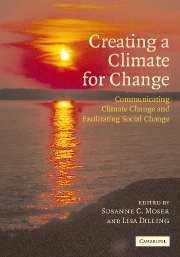Book contents
- Frontmatter
- Contents
- Preface
- Foreword
- List of contributors
- List of tables
- List of figures
- List of text boxes
- Introduction
- Part I Communicating climate change
- Part II Facilitating social change
- 15 Stuck in the slow lane of behavior change? A not-so-superhuman perspective on getting out of our cars
- 16 Consumption behavior and narratives about the good life
- 17 Educating for “intelligent environmental action” in an age of global warming
- 18 Education for global responsibility
- 19 Changing the world one household at a time: Portland's 30-day program to lose 5,000 pounds
- 20 Changing organizational ethics and practices toward climate and environment
- 21 Change in the marketplace: business leadership and communication
- 22 The market as messenger: sending the right signals
- 23 Making it easy: establishing energy efficiency and renewable energy as routine best practice
- 24 Forming networks, enabling leaders, financing action: the Cities for Climate Protection™ campaign
- 25 Ending the piecemeal approach: Santa Monica's comprehensive plan for sustainability
- 26 States leading the way on climate change action: the view from the Northeast
- 27 West Coast Governors' Global Warming Initiative: using regional partnerships to coordinate climate action
- 28 Building social movements
- 29 Climate litigation: shaping public policy and stimulating debate
- 30 The moral and political challenges of climate change
- Part III Creating a climate for change
- About the authors
- Index
- References
19 - Changing the world one household at a time: Portland's 30-day program to lose 5,000 pounds
Published online by Cambridge University Press: 20 August 2009
- Frontmatter
- Contents
- Preface
- Foreword
- List of contributors
- List of tables
- List of figures
- List of text boxes
- Introduction
- Part I Communicating climate change
- Part II Facilitating social change
- 15 Stuck in the slow lane of behavior change? A not-so-superhuman perspective on getting out of our cars
- 16 Consumption behavior and narratives about the good life
- 17 Educating for “intelligent environmental action” in an age of global warming
- 18 Education for global responsibility
- 19 Changing the world one household at a time: Portland's 30-day program to lose 5,000 pounds
- 20 Changing organizational ethics and practices toward climate and environment
- 21 Change in the marketplace: business leadership and communication
- 22 The market as messenger: sending the right signals
- 23 Making it easy: establishing energy efficiency and renewable energy as routine best practice
- 24 Forming networks, enabling leaders, financing action: the Cities for Climate Protection™ campaign
- 25 Ending the piecemeal approach: Santa Monica's comprehensive plan for sustainability
- 26 States leading the way on climate change action: the view from the Northeast
- 27 West Coast Governors' Global Warming Initiative: using regional partnerships to coordinate climate action
- 28 Building social movements
- 29 Climate litigation: shaping public policy and stimulating debate
- 30 The moral and political challenges of climate change
- Part III Creating a climate for change
- About the authors
- Index
- References
Summary
On playing fields and battlegrounds, challenges that would be daunting and impossible if faced alone are suddenly possible when tackled in a close-knit group. The people haven't changed, but the way in which the task appears to them has.
Malcolm Gladwell (2002: 264)In late 2001, denizens of several residential areas in Portland, Oregon, began knocking on doors, inviting their neighbors to take part in a campaign to reduce household carbon dioxide emissions. In doorway conversations, these volunteer “team initiators” emphasized the power of their low-carbon campaign not only to improve environmental quality, but also to promote a sense of community and enhance neighborhood life. Residents who showed interest were invited to attend a block-based information meeting in a neighbor's home.
Altogether, 130 Portland householders opened their doors to peer recruiters, and an additional 22 received invitations to introductory meetings via speakers and literature tables at large public events such as a local conference on sustainability. Seventy-two of those approached were sufficiently intrigued to attend meetings, and all but one of the 72 decided to join carbon-reducing teams. Ultimately, nine block-based teams representing 54 households came together in a pilot program to help each other diminish their impact on global climate.
In short, the CO2-reducing campaign garnered a recruitment rate of about 43 percent: almost twice that of a similar environmental-action campaign that preceded it in Portland. By community organizing standards, this is remarkable recruitment rate, according to David Gershon, whose Empowerment Institute provided the blueprint and implemented the program.
- Type
- Chapter
- Information
- Creating a Climate for ChangeCommunicating Climate Change and Facilitating Social Change, pp. 292 - 302Publisher: Cambridge University PressPrint publication year: 2007
References
- 2
- Cited by



